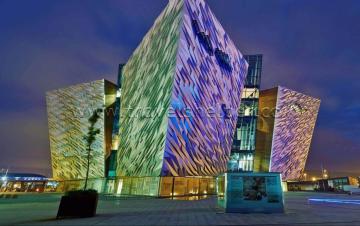The 7 Wonders of the 21st Century feature amazing successes redefining human creativity and engineering capability. From the calm Temple of Buddha's Origin in Leshan,…


Algiers, Algeria’s administrative, political, and financial center, epitomizes the rich past and energetic modernism of North Africa. Originally on the Maghreb coast of the Bay of Algiers, this city has grown to be a major metropolitan center in Mediterranean, Arab, and North Africa. Algiers has become a major hub for culture, arts, cuisine, and business due to its strategic location and varied attractions.
Over the years, the population of the city has grown rather dramatically. The census recorded 2,948,145 people in 2008; by 2020 estimates showed the population had climbed to almost 4,500,000. This quick development marks the city’s increasing importance and attraction as Algeria’s center of development and opportunity hub.
The largest city in the country, Algiers boasts a wide spectrum of infrastructure amenities. Particularly impressive is the transportation system, which links it to nearby cities and abroad sites via railway and highway connections. The main air travel hub is Houari Boumediene Airport; the Algiers Ferry Terminal allows marine connections all around the Mediterranean.
Both city residents and guests gain from a thorough mass transit network. With almost 46 million passengers expected in 2023 alone, the Algiers Metro, the city’s subway system, has grown to be a necessary part of urban life. Offering additional public transportation choices, the Algiers tramway enhances the metro. The unique topography of the city, marked by varied elevations, has made it necessary to build several gondola lift lines, so offering both practical transportation and breathtaking views of the metropolitan scene.
Algiers is a cultural center as much as a center of business and transportation hub. The city boasts several museums, art galleries, and cultural centers displaying Algeria’s and the surrounding area’s rich legacy and artistic expressions. Renowned cultural venues serving both local productions and foreign events are the Algiers Opera House and the Algerian National Theater Mahieddine Bachtarzi.
Algiers offers plenty of museums for those with an artistic or historical bent. Deep understanding of the cultural and historical fabric of the area is provided by the Bardo National Museum, National Museum of Fine Arts, National Museum of Antiquities and Islamic Art. Founded in the ancient Dar Mustapha Pacha, specialized institutions including the National Museum of Miniatures, Illumination and Calligraphy offer unique insights into specific aspects of Algerian and Islamic art.
Architectural icons of the city clearly show its commitment to preserve its legacy while embracing modernism. A UNESCO World Heritage Site, the Casbah epitomizes classic North African architectural and urban design. Comprising historical buildings and serpentine alleys, this ancient citadel offers insight into the history and purposes of the city and acts as a living museum of Algerian culture.
The skyline and cultural character of the city are much shaped by religious architecture. Third-largest mosque in the world, Djamaa el Djazaïr is a shining example of modern Islamic design. Other important religious sites show the different spiritual legacy of Algiers by including the Ketchaoua Mosque and Notre-Dame d’Afrique.
Monuments like Maqam Echahid (Martyrs Memorial), a magnificent structure overlooking the city and featuring the Martyrs National Museum, reflect the city’s commitment to honoring its past and heroes. Public areas like Martyr’s Square and Emir Abdelkader Square serve as gathering places and emblems of the country’s independence effort.
Algiers’ value goes beyond history and culture to include international events and sports. Among the prestigious sporting events the city has hosted are the 1975 Mediterranean Games, the 1990 African Cup of Nations (co-hosted with Annaba), the 1978 and 2007 All-Africa Games, the 2018 African Youth Games, and most lately the 2023 Arab Games (co-hosted with four other cities). These activities not only show the best sports facilities in the city but also its capacity to welcome foreign guests.
The presence of well-known corporate headquarters emphasizes Algiers’ economic importance. Algiers hosts both Air Algérie, the national airline, and Sonatrach Petroleum Corporation, a major player in the worldwide energy scene. These businesses greatly boost the economic life of the city as well as its reputation as a business center in North Africa.
Algiers lies in a varied topography. Attaching heights of up to 407 meters, the city stretches from the coast, roughly two meters above sea level, to the Sahel of Algiers and the Bouzaréah massif. Apart from providing amazing views, this varied topography influences the urban planning dynamics and the climate of the city.
Algiers’s identity and economy are much influenced by its natural surroundings. Not far from the city, the Mitidja plain is a major agricultural region. Rivers like the Oued El Harrach and Mazafran River, which meet the sea at the edge of the city, boost local agricultural output. Seen from the city, the nearby Tell Atlas mountain range accentuates the arresting backdrop of this coastal city.
Currency
Founded
Calling code
Population
Area
Official language
Elevation
Time zone
Offically known as the People's Democratic Republic of Algeria, Algeria is a major nation in North Africa's Maghreb. Comprising 2,481,741 square kilometers, this vast nation is 10th in the world…
The 7 Wonders of the 21st Century feature amazing successes redefining human creativity and engineering capability. From the calm Temple of Buddha's Origin in Leshan,…

Home France is recognized for its significant cultural heritage, exceptional cuisine, and attractive landscapes, making it the most visited country in the world. From seeing…

Discover the vibrant nightlife scenes of Europe's most fascinating cities and travel to remember-able destinations! From the vibrant beauty of London to the thrilling energy…

While many of Europe's magnificent cities remain eclipsed by their more well-known counterparts, it is a treasure store of enchanted towns. From the artistic appeal…

From Rio's samba spectacle to Venice's masked elegance, explore 10 unique festivals that showcase human creativity, cultural diversity, and the universal spirit of celebration. Uncover…

© All Rights Reserved. By Travel S Helper